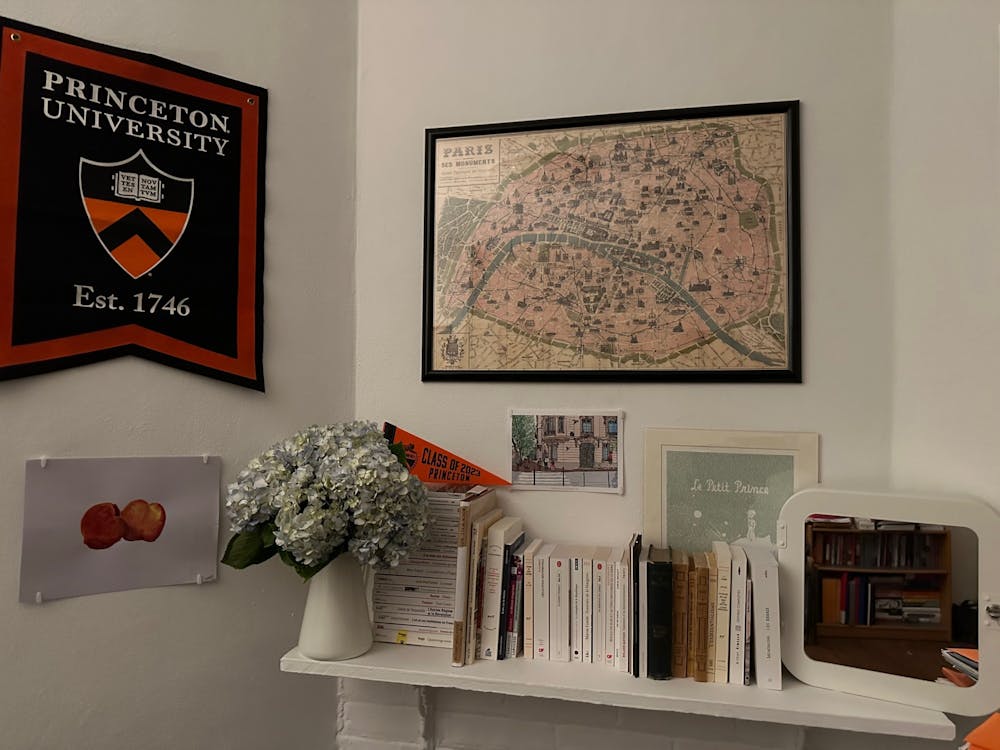The stars are around for any and all of my walks after dinner. From Tower Club to The Daily Princetonian newsroom and then back to my dorm, the sky is there for me. Such moments of looking up to the night sky carry a lot of memories for me; I’m reminded of previous night walks and all their varied emotions — some good, some less so.
There was a moment earlier this year when I tried explaining to a friend that my year was not one of a broken heart, but rather one of a heart cracked open. The two are similar, but they are distinct. They’re both painful, but only the latter’s pain can subside to reveal any reward. No one cares about something broken until it’s mended or replaced. But something cracked open? It’s only the beginning — there’s a whole future ahead.
With a heart cracked open, I was left with no choice but to learn what was inside. Sometimes, it was like staring into a geode, eyes dazzled by the marvelous interior — fascinated, relieved, excited by the discovery. Sometimes, it was like staring into a sinkhole, eyes searching but ultimately lost in the void — scared, confused, worried by what was to be found in the darkness as one looked deeper.
Yes, this was all provoked by loves mistreated or misinterpreted or misplaced. But they are all only provocations. The outcome is elsewhere — totally within me, within my control. As I’ve shuffled through the pieces of my cracked-open heart, I’ve discovered so much: pieces doing everything possible to escape from the past; pieces so entrenched in the past they became paralyzed in the face of the future; and pieces clawing desperately at the present, trying so hard to keep yet another instant from slipping away. All these pieces were kept so busy by these things that barely any were left to simply beat, to simply live.
In many ways, everything in my life has been marching towards the one moment when I can finally shed the hard shell of the past — the things that shrouded me, constricted me, suffocated me — in order to just live now and towards the future. This is why I consider this my year of a heart cracked open: because that shell has finally come off.
But I haven’t forgotten that a shell also protects. The shell’s breaking — the very act of cracking it all open — is where the pain rushed in. What’s left is vulnerable, tender, fragile. What’s left is free — at last, but for only the first time. What’s left has so much learning to do.
More recently, I have found myself confronting the question of how to be an individual in the world. It is such a foundational and consequential question. I’ve confronted it in my life and in my studies alike — so many questions about how to see, how to feel, and how to act upon this world. Fortunately, I’ve stumbled upon some attempts at answers in recent months. Now, I mostly store them on a little shelf in my room. From this shelf, there are two little sections I keep revisiting:
“Car l’amour demande un peu d’avenir, et il n’y a plus pour nous que des instants.” For love demands a little future, and there is not any more for us but some instants.

“On me dit : ce genre d’amour n’est pas viable. Mais comment évaluer la viabilité ? Pourquoi ce qui est viable est-il un Bien ? Pourquoi durer est-il mieux que brûler ?” Someone says to me: this type of love is not viable. But how to evaluate viability? Why is that which is viable a Good? Why is to endure better than to burn?
Individually, separately, these two passages — from Albert Camus and Roland Barthes, respectively — stand in opposition to each other.
In my mind and in my heart, however, they become entangled, and I try my best to weave them together. This life seems to demand things that shall endure well into the future; this endurance is what determines viability. But I have only instants. Life is one instant after another. In an instant, I cannot know what will endure. An instant is only long enough for a spark, for the reaction of fire to occur once more. That can be good enough.
So, as this year has crept on and now wanes, I’ve learned to watch this life burn on, one instant at a time. I’ve found love come and go and return one instant at a time, and the stars above me remain shining. These instants — a smile while I return to the kitchen for a second serving at a friendsgiving celebration; a giant snowflake melting on my nose amid the euphoria of the first snowfall; a pause to feel thankful for it all — they are good.

José Pablo Fernández García is a senior from Ohio and a head editor for The Prospect at the ‘Prince.’ He can be reached at jpgarcia@princeton.edu.
Self essays at The Prospect give our writers and guest contributors the opportunity to share their perspectives. This essay reflects the views and lived experiences of the author. If you would like to submit a Self essay, contact us atprospect@dailyprincetonian.com.








